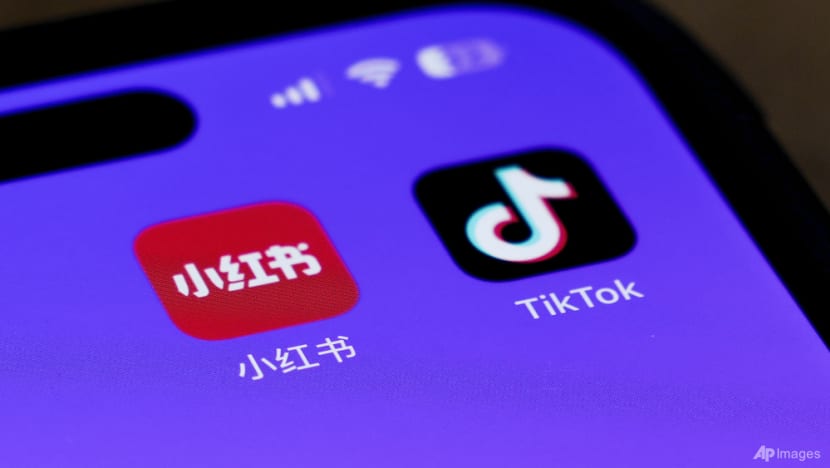Commentary: Xiaohongshu success with ‘TikTok refugees’ is testing China’s Great Firewall
Xiaohongshu has risen dramatically while the fate of TikTok hangs in the balance, providing a rare opportunity for American and Chinese users to interact directly, says Konrad Lee from the Asia Society Policy Institute.

Icons for the smartphone apps Xiaohongshu and TikTok are seen on a smartphone screen in Beijing, Jan 14, 2025. (AP Photo/Andy Wong)

This audio is generated by an AI tool.
NEW YORK: Chinese social media app Xiaohongshu has been chosen by TikTok’s American users as the platform to show defiance against the US government’s decision to ban the Chinese-owned short-video app over national security concerns.
Xiaohongshu, also known as RedNote, has become an unforeseen channel for direct interaction and mutual engagement between netizens in the US and China - and as such, a test for Chinese authorities.
Despite having a mostly Chinese-language interface, US downloads of Xiaohongshu skyrocketed before the imminent TikTok ban, hitting over 1.2 million across December 2024 and the first half of January 2025. The app, best described as an amalgamation of Instagram and Pinterest, has now transformed from having an overwhelmingly Chinese user base to being inundated by self-proclaimed “TikTok refugees”.
In China, foreign social media platforms like Facebook, Instagram and X have long been blocked due to concerns over the potential for political dissent and the ability to control information sharing. Unlike TikTok, which has a sister app Douyin exclusively for Chinese users, Xiaohongshu is a purely Chinese operation.
Many Chinese users of Xiaohongshu have welcomed the rare opportunity to directly interact with new US users, asking them to pay the “cat tax” (providing photos of their pets as “payment” for joining), but also guiding them through the interface and even giving them Chinese names.
Xiaohongshu’s recent success is an unusual way of bypassing China’s so-called “Great Firewall”. But will it be over faster than you can say “Virtual Private Network”?
BEIJING’S SURPRISING REACTION SO FAR
So far, Beijing seems to be reacting positively to this unexpected development. Foreign ministry spokesperson Guo Jiakun remarked at a press briefing on Jan 15 that “China has always supported and encouraged strengthening cultural exchanges and promoting mutual understanding among the peoples of all countries”.
Chinese state media have struck a similar tone. An article in China Daily extolled the fact that Xiaohongshu has now become the platform to build bridges that transcend politics and geography. A Global Times editorial said that despite the “information cocoon” in the West that has demonised China, many new American users on Xiaohongshu have been welcomed by “the friendliness and openness of Chinese users”.
Yet while many new US users have demonstrated a willingness to be educated by their Chinese counterparts on language, cultural and historical issues, some are beginning to brush up against the limits of China’s internet censorship.
Posts that cover sensitive or censored topics, ranging from political issues such as Xinjiang and Tiananmen to social issues like religion and drugs, have been hit by violation notices and blocked from view for violating community guidelines and standards.
Aside from the challenges posed by content that crosses Beijing’s red lines, the question is whether this kind of new cross-cultural dialogue will remain welcome.
Some Chinese netizens have already expressed reservations, ranging from fears that the elements that had made the app so unique for its Chinese users would be diluted in favour of the new user demographic, to nationalist concerns of the infiltration of US and Western influences.
For Xiaohongshu, the surge of new users has sent the app scrambling to moderate content in line with Beijing’s censorship requirements. Chinese bloggers and influencers (bozhu) on the platform have been quick to inform new users of the dos and don’ts of the app, including rules and important restrictions to avoid getting banned from the app.
The app’s community guidelines start by laying out values: All content should comply with the Chinese Constitution and laws; practice the 12 core socialist values (in line with China’s Communist Party ideology); promote patriotism, collectivism, and socialism; and spread the correct view of history, nationality, country and culture.” Incidentally, these guidelines only appear on the original Chinese language interface, and do not appear on the English version.
COULD THE VISE TIGHTEN ON XIAOHONGSHU?
Given that one of President Donald Trump’s first acts upon returning to the Oval Office was to delay the TikTok ban, whether Xiaohongshu’s new Western audience will stay active (or be allowed to) on the platform remains to be seen.
As a Chinese-developed and -owned app, Xiaohongshu is subject to the laws and regulations of the Chinese government, which may pose difficulties for American users who are accustomed to freedom of speech on social media platforms. Some US users have already learned that lesson the hard way.
Should intercultural dialogue on Xiaohongshu prove too much of a risk to Chinese censorship, Beijing may tighten its vise on the app.
According to a leaked internal document in 2022, the platform already actively censors discussions that could be deemed controversial or destabilising. If the continued interaction between US and Chinese users begins to jeopardise the pre-existing culture of self-censorship that exists on Chinese social media, Beijing may begin looking for less subtle methods to enforce compliance with its strict regulatory framework.
Furthermore, though TikTok may have earned a temporary reprieve, there is no guarantee that Xiaohongshu will not be subject to a similar investigation and ban by the US government down the line.
While it remains to be seen whether “TikTok refugees” will assimilate and learn to adhere, or if the Chinese authorities will find a balance between encouraging intercultural exchanges and maintaining the integrity of the Great Firewall, Xiaohongshu’s dramatic rise in the West has provided a rare and fascinating look into what happens when Chinese and American netizens collide.
Konrad Lee is a Program Assistant at the Asia Society Policy Institute in New York, who focuses on foreign policy and US-China relations.


















